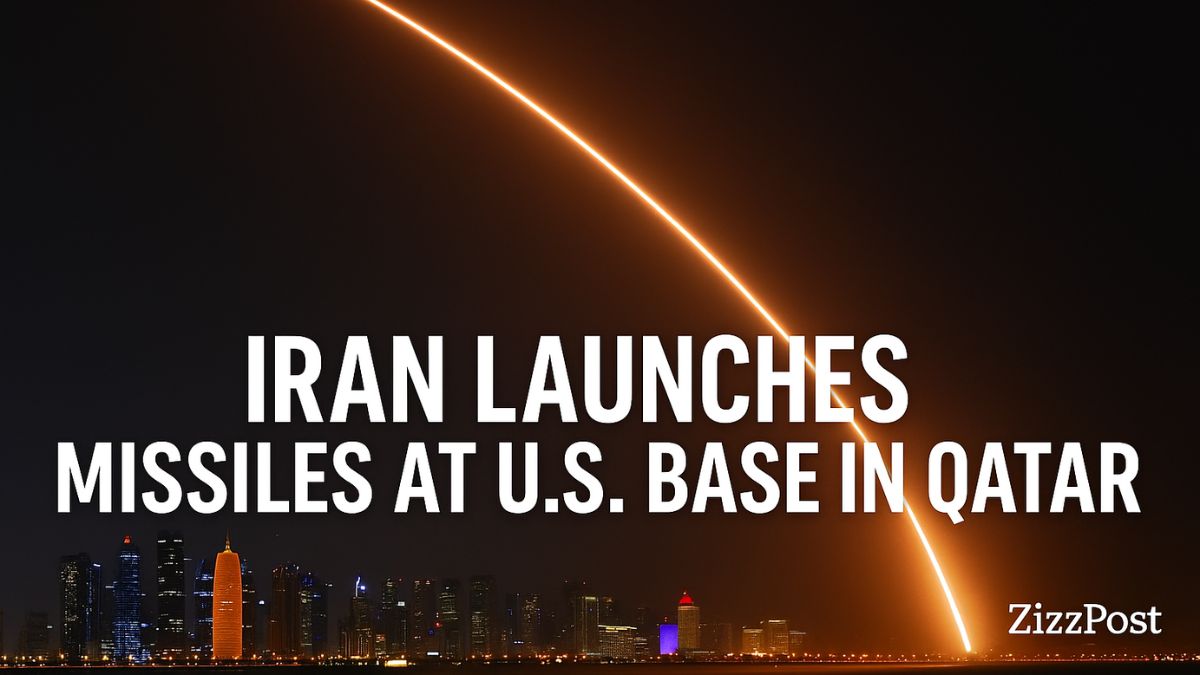New York: On June 23, 2025, a series of missiles launched from Iran lit up the skies over Doha, targeting one of the most heavily guarded U.S. military installations in the Middle East—Al Udeid Air Base in Qatar. The missile attack has drawn global attention, especially from Americans stationed in the Gulf, as Iran confirmed its first direct military strike on Qatari soil hosting U.S. troops.
As explosions echoed near Doha’s outskirts, the Qatari government responded swiftly by closing its airspace, grounding Qatar Airways flights and rerouting air traffic across the Gulf. Footage circulating on social media captured missile trails over Qatar’s capital city, while residents reported feeling tremors and hearing multiple loud blasts near the base.
While no casualties have been reported, the attack marks a critical escalation in Iran’s ongoing tensions with the United States and Israel. For the 10,000+ American personnel stationed in Qatar—and millions watching from home—this strike isn’t just symbolic. It’s a warning shot fired from Tehran, landing just miles from Doha International Airport, and shaking one of America’s strongest Middle Eastern alliances.
🧾 What We Know So Far
- Iran launched multiple missiles at the U.S. Al Udeid Air Base in Qatar on June 23, 2025
- Qatar closed its airspace immediately, suspending all flights from Doha
- No U.S. casualties reported, but tension is rising across the region
- U.S. military forces are on high alert across bases in the Gulf
- The Pentagon is evaluating its response as global leaders call for restraint
What Is Al Udeid Air Base—and Why Was It Targeted?
Al Udeid Air Base, located 20 miles southwest of Doha, is the largest U.S. military installation in the Middle East. It serves as a launchpad for air operations across Iraq, Syria, Afghanistan, and the broader region. Housing advanced aircraft, drone fleets, and intelligence units, it’s a strategic linchpin for CENTCOM.
Iran’s missile strike—confirmed by Tehran’s Islamic Revolutionary Guard Corps (IRGC)—was a direct response to recent U.S. strikes on Iranian infrastructure. Iranian media dubbed the operation “a justified warning,” while Western intelligence sources suggest the attack was carefully timed to avoid American casualties.
Qatar Airspace Closed After Missile Launches
Shortly after the attack, Qatar shut down its airspace, halting all commercial operations out of Doha Airport and suspending Qatar Airways flights. U.S. officials also confirmed temporary lockdown procedures at Al Udeid, while the U.S. Embassy in Doha issued an urgent alert for citizens to avoid public areas and follow security advisories.
According to reports, missiles were fired from western Iran, crossed Iraqi airspace, and struck near Al Udeid with partial interception from defense systems. Although no damage was confirmed to key infrastructure, multiple explosions were heard in Qatar, particularly near Qatar’s U.S. base and air force sectors.
U.S. Military Response Underway
A senior Pentagon official stated that the U.S. is “assessing all options,” but emphasized that the safety of American forces remains the top priority. While Al Udeid Air Base in Qatar has not released casualty figures, satellite imagery suggests that many U.S. military aircraft were moved in advance—indicating some degree of anticipation.
President Donald Trump, speaking from Florida, called the missile attack “an act of aggression that will be answered firmly, not emotionally.” Reports indicate that additional troops may be deployed to Gulf U.S. bases, and that high-alert status has been declared in Kuwait, Bahrain, and UAE.
Iran Missile Strike
This was not just an attack on a base—it was an attack on a symbol. The U.S.–Qatar military alliance, long seen as stable, is now in the spotlight. It also puts pressure on regional neighbors like Saudi Arabia and the UAE, who rely on Al Udeid’s defense systems.
For civilians, the attack has ripple effects—Qatar’s airspace serves as a vital artery for international travel. Flights from Europe, Asia, and the U.S. frequently transit through Doha, and closures or rerouting could impact tourism, trade, and logistics.
And for the U.S., this becomes a test of diplomatic and military resolve. Will Washington retaliate? Will Qatar shift its position between the U.S. and Iran? And most importantly, will more missile launches from Iran follow?
What U.S. Citizens in Qatar Should Do Now
If you are an American citizen currently in Qatar:
- Register with the U.S. Embassy or the STEP Program
- Avoid Al Udeid base and nearby public areas
- Stay indoors during high-alert advisories
- Follow Doha’s curfew or air travel restrictions (if extended)
For Americans with travel plans to Qatar, it is advisable to contact your airline, check advisories at travel.state.gov, and follow updates on Qatar news and Al Udeid security developments.
Also Read
🛩️ B‑2 Bombers in Guam: What It Means & How Many the U.S. Has
What role do America’s stealth bombers play in global deterrence—and why Guam matters now more than ever?
☢️ Who Holds the Power? Countries With Nuclear Weapons in 2025
From U.S. to Iran, here’s the full list of nuclear-armed nations—and what that means for world security.
⚔️ Why Are Israel and Iran at War Right Now? The Conflict Explained
The backstory to the escalating strikes, diplomatic failures, and the new face of regional warfare.
🚀 Why Iran’s Hypersonic Strike on Israel Has the World Holding Its Breath
The first hypersonic attack of 2025 just happened. Here’s why it matters—and what the UN is doing about it.







